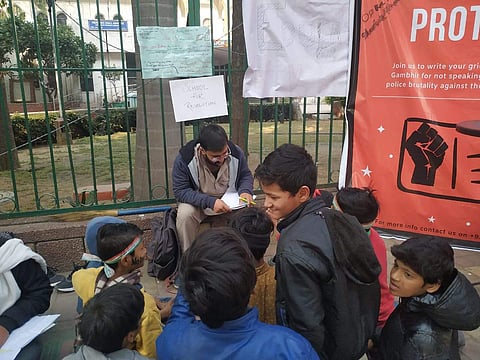

The students who started the mass movement against Citizenship (Amendment) Act 2019 (CAA) and National Register of Citizen (NRC) have often been blamed for not knowing the issue in its entirety. Some leaders also claimed that they are being led astray by people with vested interests. But as you walk past Jamia Millia Islamia's Gate 10 a huge pile of books greet you — a roadside library with over 200 titles. They call it Read for Revolution. The students are also teaching kids from the neighbourhood the true meaning of democracy, representation and most importantly the Constitution.
The students said that they did not want to stop studying just because they were out on the streets to protest. More so because the police had shot tear gas shells through the library windows and then allegedly vandalised the reading rooms."We wanted to continue our protest but did not want to stop studying. We have books on Gandhi, Rabindranath Tagore's Gitanjali, DU professor Manoj Kumar Jha's books — people have been donating books for the library and we have around 200 books at present. Journalist Prem Panicker, historian Rana Safvi and author of children's books Sabina Mishra were among many who donated," said Sahil Ahmed, a student of Peace and Conflict Resolution at Jamia. Sahil has completed his Bachelors in Law from Jamia as well. "We spoke to some of the kids who showed interest in these books. We found out their parents were mostly migrant workers. Some were school going kids, some could read Urdu, some Hindi, while some of them did not know how to read or write," Sahil added.
Once Sahil struck up a conversation with the kids and he found out why they were there in the first place. "When I asked them what they were doing at the protest site they said 'Hum nara lagane aaye hain' (We came for sloganeering). I asked them if they knew what they were protesting against. They didn't. I sat down and tried to explain what we are protesting against," said Sahil. "They said they would be interested if I asked one of my friends to come and teach them. They agreed," added Sahil.
Ahmed Nabeel, a classmate of Sahil, was called in the next day. Nabeel is busy preparing for UPSC, but promised to take out a few hours a day to teach the kids. "A lot of the young people who are protesting alongside the students did not know what the issue was about. We decided to teach them the basics. I started by asking them what their idea of democracy is. None of them knew exactly what it is. So, my first class was just about democracy and how they too are an integral part of it. I also told them about the movement and tried to explain why we are all out on the streets. They knew we were demanding Azadi because the slogans said so but they could not quite grasp what we wanted to be free from," said Nabeel.
Nabeel explained why their movement was against an Act that they felt was unconstitutional. "I explained that Azadi is not a Muslim issue but a larger constitutional issue," said the law graduate. However, attendance is obviously an issue for this makeshift school. "There is no way to call the kids. We don't know where they live. We ask them to come here at a particular time and then I start teaching. Some of them are extremely interested and promised to come every day. Some do not quite grasp it and leave, taking their friends or siblings along with them. We cannot force anyone to stay but the response so far has been great," added Nabeel.
